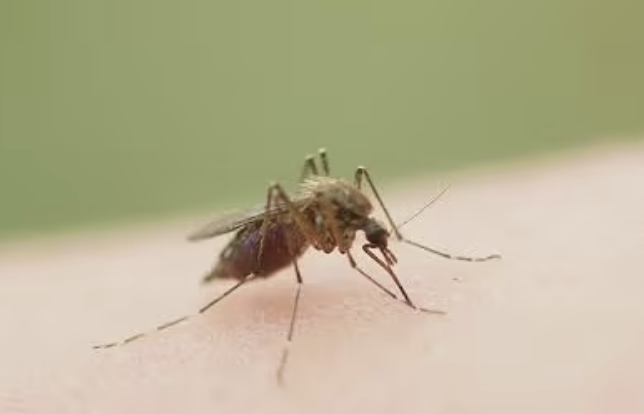
When mosquitoes carrying an unfamiliar virus show up in your neighborhood, it's worth paying attention. That's exactly what happened on Long Island this fall, where health officials confirmed the first locally acquired case of chikungunya virus in New York state—and the first anywhere in the United States since 2019.
While the immediate risk remains low thanks to cooler autumn temperatures, this development signals a concerning trend that particularly affects Americans over 60.
Here's what you need to know about chikungunya and why it's become a growing concern for older adults.
What happened in New York
Health officials confirmed that someone in Nassau County contracted chikungunya from a mosquito bite right there on Long Island.
This wasn't a case of someone bringing the virus back from tropical vacation—this was local transmission, meaning infected mosquitoes are now present in the area.
The Aedes albopictus mosquito, which can carry chikungunya, already lives in parts of downstate New York.
When one of these mosquitoes bites an infected traveler, it can become infected and then spread the virus to others through subsequent bites.
'An investigation suggests that the individual likely contracted the virus following a bite from an infected mosquito,' health officials noted, though they couldn't pinpoint the exact source of exposure.
Also read: Rare virus expands to new regions, prompting global health warning
Why seniors should pay extra attention
Adults aged 65 and older face higher risk for severe chikungunya disease, especially those with underlying medical conditions like diabetes, heart disease, or high blood pressure.
While deaths from chikungunya are rare, they usually occur in elderly people with other coexisting health problems.
The virus isn't typically fatal, but it can pack a punch that's particularly problematic for aging bodies.
Joint pain from chikungunya can be debilitating and may persist for weeks to years—something that can significantly impact mobility and quality of life for older adults who may already be managing arthritis or other joint issues.
"Joint pain can be debilitating and may persist for weeks to years"
The name "chikungunya" actually comes from a Tanzanian word meaning "that which bends up," referring to the stooped posture caused by severe joint pain.
For seniors already dealing with mobility challenges, this additional burden could be particularly difficult.
A troubling global surge in 2025
This New York case didn't happen in isolation.
Chikungunya outbreaks have been reported in 119 countries this year, making 2025 one of the worst years on record for the virus's spread.
Climate modeling suggests around 5.66 billion people now live in areas environmentally suitable for chikungunya transmission.
The virus has moved far beyond its traditional tropical homes.
Large outbreaks involving sustained local transmission occurred in 2025 in more temperate regions such as China, France, and Italy.
Climate change is expanding the range where disease-carrying mosquitoes can survive and thrive.
What is chikungunya?
Chikungunya is a mosquito-borne viral disease that causes sudden fever, severe joint pain, headache, muscle pain, and sometimes a rash.
The disease cannot spread directly from person to person—you can only get it from infected mosquito bites.
Most people recover within a week, but joint pain can linger for months or years.
Also read: Breaking: The CDC is investigating this vaccine—are you at risk after recent hospitalizations?
Vaccine complications for older adults
Here's where things get complicated for seniors considering protection.
Two chikungunya vaccines are available in the United States, but both have significant limitations for older adults.
As of August 22, 2025, the FDA suspended the US license for IXCHIQ, the live-attenuated chikungunya vaccine, following safety concerns.
Seventeen serious adverse events, including two deaths, were reported in people aged 62 through 89 who received the vaccine globally.
The two fatalities involved an 84-year-old man who developed encephalitis and a 77-year-old man with Parkinson's disease whose swallowing difficulties worsened, possibly leading to aspiration pneumonia.
The other available vaccine, VIMKUNYA, uses a different technology and may be safer for older adults, but access remains limited and guidance continues to evolve.
Also read: Health alert: Virus tied to birth defects and paralysis resurfaces in top travel spot
Practical prevention for older adults
Since vaccine options remain complicated, prevention through mosquito bite avoidance becomes crucial.
Health officials recommend several strategies that work well for seniors:
Repellent use: Apply EPA-registered insect repellents containing DEET or picaridin to exposed skin. Follow manufacturer instructions carefully, and don't hesitate to ask a pharmacist about which products work best for your skin type.
Smart clothing choices: When spending time outdoors, especially during dawn and dusk when mosquitoes are most active, wear long sleeves, long pants, and socks. Light-colored, loose-fitting clothing provides the best protection.
Home maintenance: Remove standing water around your property—check flowerpots, buckets, gutters, and birdbaths regularly. These provide perfect breeding spots for Aedes mosquitoes, which prefer small containers of stagnant water.
Screen repair: Patch any holes in window and door screens. Unlike some mosquitoes that prefer outdoor biting, Aedes mosquitoes will come inside homes and bite during daylight hours.
Recognizing the symptoms
Chikungunya symptoms typically appear 3–7 days after being bitten by an infected mosquito.
The onset is usually sudden and includes:
- High fever (often over 102°F)
- Severe joint pain, particularly in hands, feet, knees, and ankles
- Headache and muscle pain
- Skin rash (appears in about half of cases)
- Nausea and fatigue
The joint pain is often described as the most distinctive symptom—it’s typically more severe than what you'd experience with the flu and may cause visible swelling.
Did you know?
Did you know?
The Aedes albopictus mosquito that carries chikungunya is sometimes called the 'Asian tiger mosquito' because of its distinctive black and white striped pattern. Unlike many mosquito species that are most active at dawn and dusk, these mosquitoes bite throughout the day and prefer to feed indoors.
Also read: Something alarming is moving state to state that is prompting nationwide health alerts
What this means for the future
Climate change continues to expand the range where chikungunya-carrying mosquitoes can survive.
The Aedes albopictus mosquito has been steadily moving northward in the United States, and warmer temperatures extend the season when they remain active.
State Health Commissioner Dr. James McDonald noted that while current nighttime temperatures keep the risk very low in New York, this situation could change as climate patterns shift.
What happened on Long Island this fall might become more common in coming years.
The unpredictability of chikungunya outbreaks adds another layer of concern.
Recent research analyzing 86 outbreaks found they are "unpredictable in both size and severity"—you can have one outbreak that infects just a few people and another in a similar setting that infects tens of thousands, making public health planning and vaccine development difficult.
What seniors need to remember about chikungunya
- Older adults with chronic conditions face higher risk for severe disease
- Long-term joint pain can persist for months or years after infection
- Current vaccines have safety concerns for people over 60
- Prevention through mosquito bite avoidance is your best protection
- Climate change is expanding the risk area northward into temperate regions
Also read: West Nile alert: Why hospitals turned away a man bitten by mosquito–Are you at risk?
Staying informed and prepared
While the immediate risk from the Long Island case remains low due to seasonal temperature drops, this development serves as an important reminder that mosquito-borne diseases are expanding their reach.
For older adults, staying informed about these changes and maintaining good prevention habits becomes increasingly important.
Keep an eye on local health department updates about mosquito activity in your area.
If you're planning travel to regions with known chikungunya activity, discuss prevention strategies and potential vaccine options with your healthcare provider well in advance of your trip.
The key takeaway isn't to panic about the single New York case, but to recognize that the disease landscape is shifting.
By staying informed and maintaining simple prevention practices, you can protect yourself while health officials and researchers work on better solutions for the future.
Read next:
- This natural trick keeps mosquitoes away—and it's a game-changer for outdoor nights
- He felt a 'bite'—What happened next? Three deadly brain diseases hit at once!
- Shocking FDA alert: Could these common supplements be harming your grandchild’s health?
What questions do you have about mosquito-borne diseases in your area? Have you noticed changes in mosquito activity where you live? Share your thoughts and experiences in the comments below.
Primary Source
Chikungunya fact sheet
Cited text: Patients at extremes of the age spectrum are at higher risk for severe disease including newborns infected during delivery to infected mothers or bitt...
Excerpt: Adults aged 65 and older face higher risk for severe chikungunya disease, especially those with underlying medical conditions
https://www.who.int/news-room/fact-sheets/detail/chikungunya
Chikungunya fact sheet
Cited text: Severe symptoms and deaths from chikungunya are rare and usually occur in young babies or elderly people with other coexisting health problems.
Excerpt: While deaths from chikungunya are rare, they usually occur in elderly people with other coexisting health problems
https://www.who.int/news-room/fact-sheets/detail/chikungunya
FDA and CDC Recommend Pause on Chikungunya Vaccine IXCHIQ for Adults 65 and Older
Cited text: Joint pain can be debilitating and may persist for weeks to years.
Excerpt: Joint pain from chikungunya can be debilitating and may persist for weeks to years
https://www.contagionlive.com/view/...ngunya-vaccine-ixchiq-for-adults-65-and-older
Expanding threat of chikungunya in 2025—The Lancet Microbe
Cited text: User License: Creative Commons Attribution (CC BY 4.0) | Elsevier
Excerpt: Chikungunya outbreaks have been reported in 119 countries this year
https://www.thelancet.com/journals/lanmic/article/PIIS2666-5247(25)00189-2/fulltext
Chikungunya’s 2025 surge sparks urgent research response—Drug Target Review
Cited text: The 2025 chikungunya outbreak spans 119 countries, driving urgent research into vaccines, antivirals and diagnostics.
Excerpt: Chikungunya outbreaks have been reported in 119 countries this year
https://www.drugtargetreview.com/ne...s-2025-surge-sparks-urgent-research-response/
Expanding threat of chikungunya in 2025—The Lancet Microbe
Cited text: Hamer commented “the progressive warming of the global climate, aberrant weather patterns leading to increased rainfall in some locations, the continu...
Excerpt: Climate modeling suggests around 5.66 billion people now live in areas environmentally suitable for chikungunya transmission
https://www.thelancet.com/journals/lanmic/article/PIIS2666-5247(25)00189-2/fulltext
Expanding threat of chikungunya in 2025—The Lancet Microbe
Cited text: Worryingly, large outbreaks involving sustained local transmission also occurred in 2025 in more temperate regions such as China, France, and Italy.
Excerpt: Large outbreaks involving sustained local transmission occurred in 2025 in more temperate regions such as China, France, and Italy
https://www.thelancet.com/journals/lanmic/article/PIIS2666-5247(25)00189-2/fulltext
Chikungunya Vaccines | Chikungunya Virus | CDC
Cited text: As of Friday, August 22, 2025, FDA suspended the U.S. license for IXCHIQ, the live-attenuated chikungunya vaccine.
Excerpt: As of August 22, 2025, the FDA suspended the U.S. license for IXCHIQ, the live-attenuated chikungunya vaccine
https://www.cdc.gov/chikungunya/vaccines/index.html
FDA and CDC Recommend Pause in Use of Ixchiq (Chikungunya Vaccine, Live) in Individuals 60 Years of Age and Older While Postmarketing Safety Reports are Investigated | FDA
Cited text: As of May 7, 2025, 17 serious adverse events, including two that resulted in death, have been reported in individuals 62 through 89 years of age who r...
Excerpt: Seventeen serious adverse events, including two deaths, were reported in people aged 62 through 89 who received the vaccine globally
https://www.fda.gov/vaccines-blood-...ccine-live-individuals-60-years-age-and-older
Ixchiq Vaccine Linked to Fatal Adverse Events in Seniors, FDA and CDC Urge Caution
Cited text: Six of these reports have been from the United States.”3 · Of the 2 fatalities, one was a male patient 84 years of age who had encephalitis, and the o...
Excerpt: The two fatalities involved an 84-year-old man who developed encephalitis and a 77-year-old man with Parkinson
https://www.pharmacytimes.com/view/...vents-in-seniors-the-fda-and-cdc-urge-caution
Study of 86 chikungunya outbreaks reveals unpredictability in size and severity
Cited text:
Excerpt: Recent research analyzing 86 outbreaks found they are
https://medicalxpress.com/news/2025-10-chikungunya-outbreaks-reveals-unpredictability-size.html






